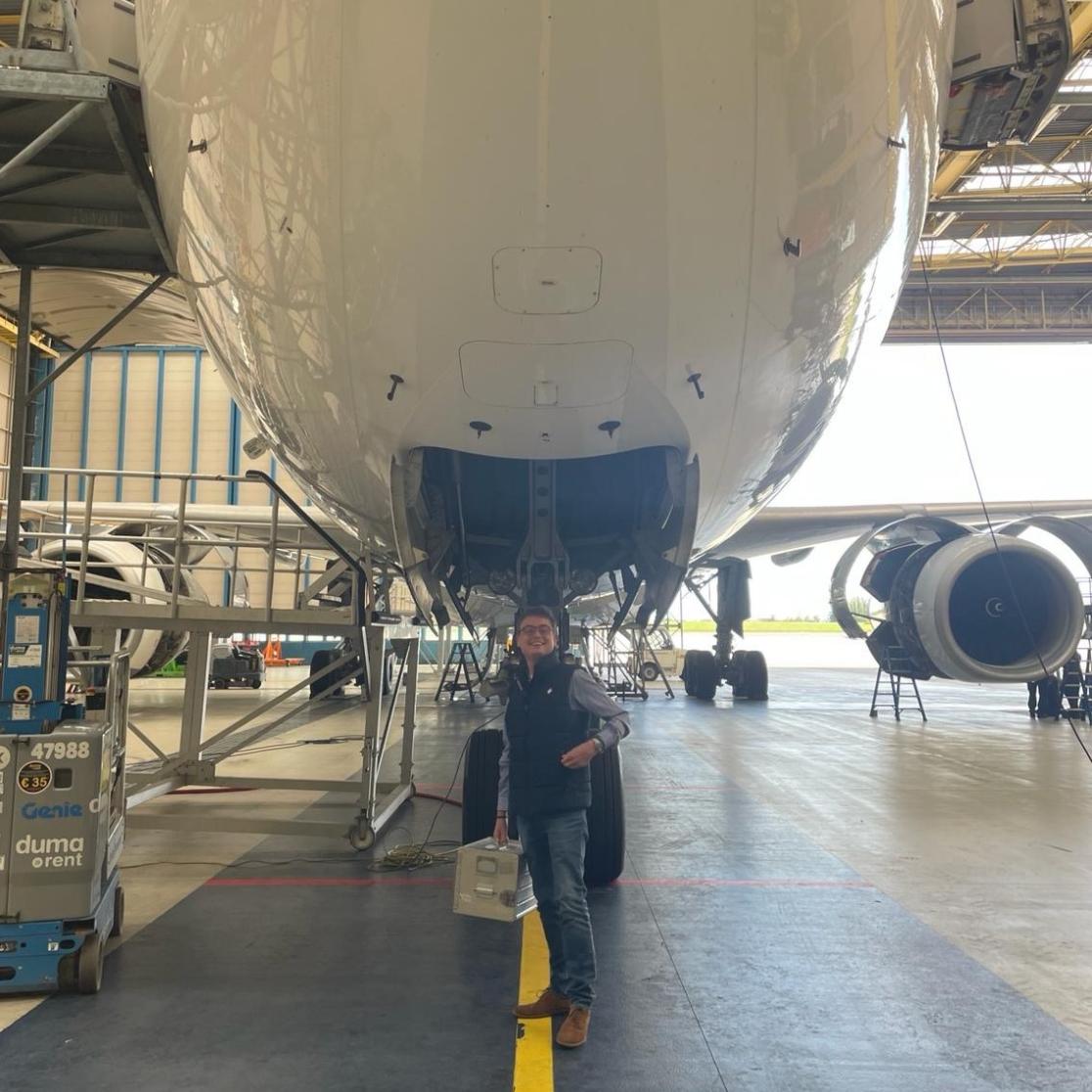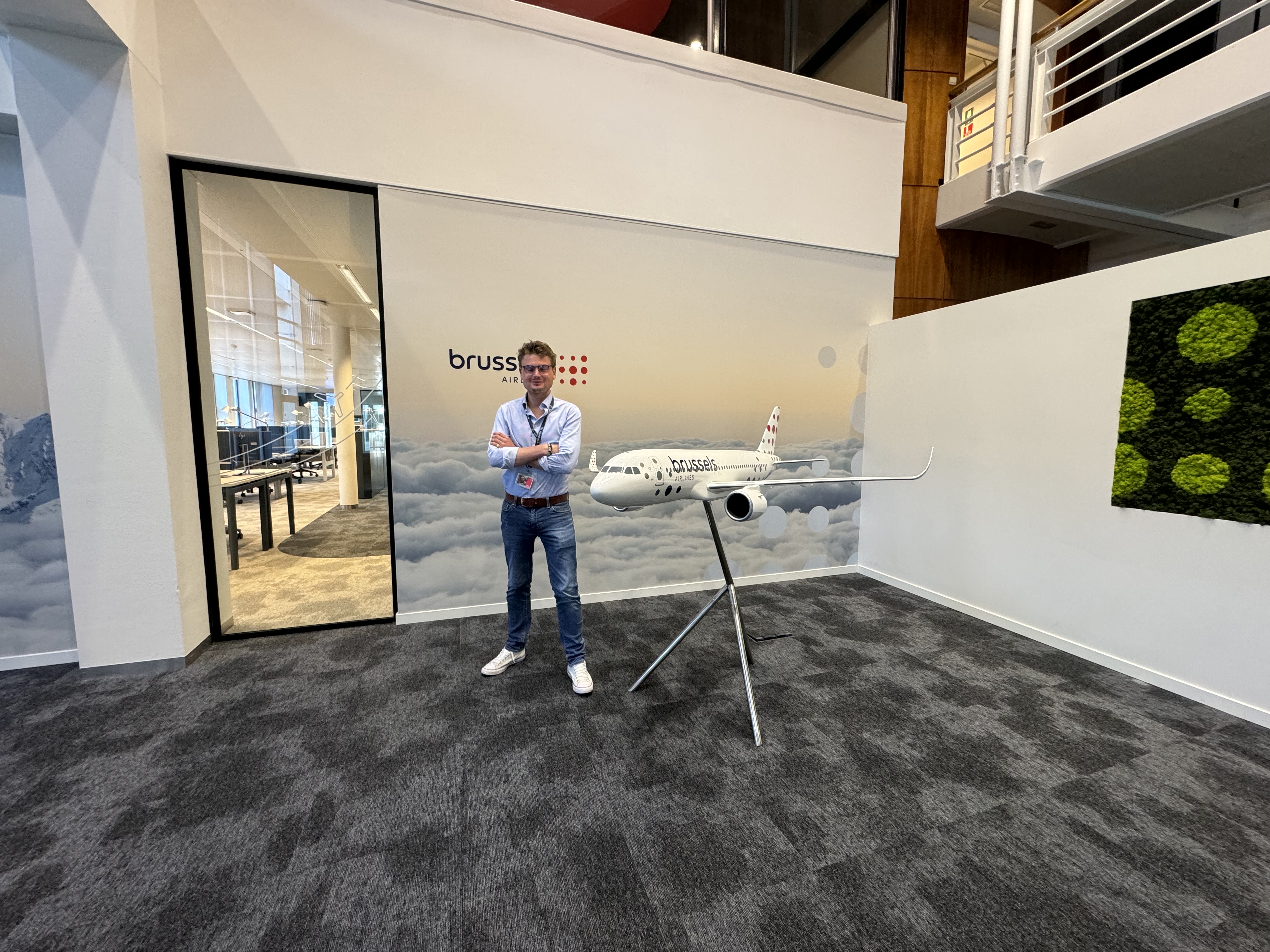Alumnus Charles Brichet's turbulent journey from law to aviation
From a childhood dream of becoming a pilot to studying law, with a brief detour into finance, and now working as a Procurement Manager for the Lufthansa Group, Alumnus Charles Brichet was determined to pursue his dream career in aviation, overcoming every obstacle, challenge, or setback along the way.
Born and raised in Brussels, Charles considers himself a ‘true European’. This comes as no surprise given he has already lived in various European cities, including Cambridge, Maastricht, Prague, Edinburgh and London. Clearly, he is no stranger to travelling and airports, quite the opposite: “I feel at home in an airport,” Charles explains. “An airport reflects the world at large, with people arriving from all corners and emotions blending together—sadness, happiness, farewells, and more. It's like a small United Nations, where global diversity converges in one vibrant hub.”
It's no wonder that Charles has a passion for the aviation industry and eventually landed a job at an airline company. However, his career path was not without challenges. His first obstacle came from within his own family.
The allure of international Maastricht
Despite his childhood dream of becoming a pilot, his family's legal background posed resistance, making a career in aviation a 'no-go.' Encouraged by his parents to pursue a more 'stable' path, he opted to study law instead.
Charles started with a preparatory year in Cambridge. “That was an eye opening experience for me,” he recalls. “It was full of international students and we basically learned English. It was my first real international experience abroad.” After returning to Brussels, Charles realised that he preferred the English approach to education and didn't want to study in Belgium like his peers. His parents then introduced him to Maastricht University and its problem-based learning system. “At first, I was quite hesitant—'problem-based learning' seemed like just another supposedly revolutionary teaching method. Reluctantly, we organised a meeting with an alumnus who took the time to introduce me to the system and the university.” After getting acquainted with the system, it made a lot more sense to him. “I then visited the university and sensed the city’s atmosphere. The locals seemed reasonably friendly and the University had a solid reputation. Maastricht ticked all my boxes. It was international yet intimate, abroad yet close to home. I had the best of both worlds and decided to go for it.”
Charles speaks fondly of his time in Maastricht, the only place besides airports where he felt like being at the United Nations. “Not that I have ever been in the United Nations’ Assembly Hall, but you get my point,” he added. The problem-based learning approach turned out to be a real game changer for him after all. It not only helped him during his studies but also in his subsequent career. “Maastricht's approach to teaching is very structured but does not compromise students' intellectual autonomy. It provides a clear framework in which students can navigate, acquire knowledge, and most importantly, learn from their mistakes. In my humble opinion, Maastricht excels at fostering independent, innovative, and solution-oriented individuals—skills that are highly valued in the job market. To me, this defines a true Maastricht Alumnus.”
From European Law during Brexit, to Air and Space Law before worldwide pandemic
Charles graduated from Maastricht University in 2017 with a bachelor’s degree of Law in his pocket. Eager to deepen his knowledge of European Law, he aimed to study in the UK before the Brexit was finalised. "I wanted to study the implications of Brexit right where the debate was most intense," Charles explained. The University of Edinburgh was the perfect place for this. “Scotland was a pro-European region of a predominantly Eurosceptic country. Experiencing the legal and political implications of this unprecedented event unfolding from behind Hadrian's Wall was truly fascinating.”
Following his time in Edinburgh, Charles pursued International Law in London. And as the culmination of his academic journey, and to finally do what he always wanted to do, he went to McGill University in Montreal to study Air and Space Law. Unfortunately, his timing was less than ideal, as a global pandemic would strike soon after his graduation.

COVID disrupting the plans
As we all know, in 2020, COVID-19 hit, and the world went in lockdown. Many industries were severely affected, but particularly the aviation industry. For Charles, this was a significant setback. He just graduated in Air and Space Law and now the whole aviation industry was collapsing. Returning to Brussels on the last commercial flight, he started with Plan B, an internship at HFW – a renowned firm specializing in aviation law – but that plan didn’t succeed. He explains, “Junior profiles are always the first to be let go when the world starts to take a turn for the worse. My contract had come to an end and that was that.”
Eventually, Charles turned to Plan C, pivoting to a financial analyst role and essentially starting from square one. Reflecting on this experience, he says, “I began in risk management and I had no background in finance, so the learning curve was steep, but I eventually got the hang of it. Although finance wasn’t exactly my cup of tea, I remain grateful to my previous employer for giving me the chance to show what I could do and prove my abilities.”
He worked at this financial company for just under two years until a new opportunity arose: a two-year management traineeship at Brussels Airlines. Charles immediately seized this opportunity, seeing it as a great way back into the aviation industry. His decision demonstrates his resilience and determination to persevere through adversity. “Being 29, I was an ‘old’ management trainee compared to my peers who were around 24 at the time. But I chose to take a step back to move forward in the right direction.” Reflecting on this decision, Charles stated, “those were two tough years, but it paid off. I currently work as a Procurement Manager for the Lufthansa Group — a position I would have never attained without my traineeship at Brussels Airlines. Nicely enough, my legal background proves very helpful in contract management and negotiation. Law managed to sneak its way back into my career after all.”
Text continues below the photo.

Future in the aviation industry
Finally, Charles is where he wanted to be since he was a kid: the aviation industry. Working for an airline offers a wealth of challenges, opportunities, and experiences, according to our alumnus. “Aviation is a complex and captivating industry. Every department within an airline is a universe in itself. The sector is driven by enthusiasts with a passion for travelling, myself included.”
Beyond extensive travel, having visited five continents this year alone—a notable perk of the job—Charles has a clear vision for his future. He plans to continue advancing his career in aviation and deepen his knowledge of the field. He’s also a dedicated advocate of the industry. While he acknowledges the ecological impact of the aviation industry, he emphasises its role as an ‘instrument of peace’. He explains, “Aviation facilitates the free movement of people globally and within Europe particularly. Airlines bridge borders between nations and bring people closer together.” Charles is also proud of the industry's progress towards sustainability: “We are moving in the right direction with various new initiatives and technologies being developed. Sustainable aviation fuel is the best example of that.”
Charles future in the aviation is looking bright, and in hindsight, Charles added that it’s probably for the best that he never became a pilot: “I wear glasses now, and maths was never my strong point, but I’m determined to at least finish my private pilot's license. Finding the time, though, is another issue.”
Why aviation? I think it’s bridging borders between nations and bring people closer together
Charles BrichetCharles’ three pieces of advice for students and young professionals
Inspired by the insights received from a UM alumnus at the start of his studies, Charles now wishes to share his pieces of advice to current students about to embark in their career:
Study, but don’t overdo it
While education is important, Charles points out that many of his peers already had 4 to 5 years of experience when he entered the job market. “For the majority, gaining practical experience early on can be more beneficial. The job market often places higher value on experience than on extensive education.” However, Charles also shares a message of resilience for those with a set goal after their studies: "If you have a passion for something or a dream, just go for it. But be strategic and prioritise according to your aspirations.”
Don't let your studies limit your career perspectives
Whatever you study, see it as a gateway to various career opportunities, not as a limitation. “Academic knowledge is valuable, but you learn most relevant skills on the job.” Charles’ law degrees, for instance, opened doors to multiple industries, from financial institutions to aviation companies. “If you have a passion, go for it whatever it takes. If it doesn’t turn out as expected, be patient and adaptable. Your degree will eventually help you get where you want to be; in the meantime, it will provide opportunities to support your journey.”
Networking is incredibly important
Charles, despite his love-hate relationship with it, highlights the importance of networking. He states, "In your career, you definitely need to know people. Knowing the right person in the right department at the right time can make all the difference.” He also strongly recommends joining alumni events, even if you'd rather stay home in your pyjamas. These gatherings are great for meeting new people and growing your network. He shares his own story: “I got an invite for the Star Lectures and, honestly, I didn’t want to go. I’d had a long day and all I wanted was a swim and some couch time. But the venue was on my way home, so I thought, why not? I walked in knowing absolutely no one and having zero expectations. Long story short, now I’m on the committee for the Brussels alumni circle. Go figure…”
Text: Janneke Haemers
Also read
-
Discover the UM Academy for Lifelong Development platform
We’re thrilled to announce the launch of the UM Academy for Lifelong Development, a comprehensive platform that brings together the diverse educational offerings from Maastricht University’s institutes. Now, all of UM’s programmes for professionals are available in one convenient location, making it...